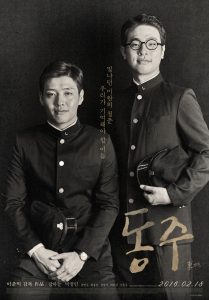Director: Lee Joon-Ik
Writer: Shin Youn-Shick
Cast: Kang Ha-Neul, Park Jung-Min, Kim In-Woo, Choi Hong-Il, Choi Hee-Seo, Shin Yoon-Joo, Min Jin-Woong
Running Time: 110 min.
By Martin Sandison
The Glasgow, Scotland leg of the 16th London Korean Film Festival appealed much more to the arthouse community, with three films being shown. Dong-Ju: Portrait of a Poet was easily the most interesting. A biopic of one of Korea’s most enduring poets, this story is strong with emotional resonance and performances from its relatively unknown actors.
The film’s depiction and story of Dong-Ju is very significant for Korean audiences, as his poetry became a voice for the revolution after the second World War, and symbolised Korea’s escape from oppression. The film depicts his life from being an idealistic teenager to his imprisonment by the Japanese (who had occupied Korea) for being involved in the revolutionary movement.
Dong-Ju: Portrait of a Poet employs a flashback and flashforward narrative, very effectively, with time frames becoming intermingled. The interrogation of Dong Ju by a Japanese officer is the centrepiece, revealing much about his life. His cousin Mong-Gyoo, a revolutionary at heart, is really the cause of his imprisonment. Despite the obvious affection they have for each other that is well-observed in the movie, I came to feel negatively about his character. Perhaps this shows how effective the movie is, as it is an unflinching portrayal of Dong-Ju and Korea at the time. Along the way the story involves many other characters such as two girls who admire and even love Dong-Ju for his gentleness and beautifully written poetry, and through one he gets to meet his hero, a fellow poet. This scene is very revealing, as his hero (whose name escapes me) advises him not to be a poet because of the coming problems in the world. The implication that even an expression as pure as poetry cannot make an impact in times of war is beautifully put across and interesting, considering the impact that Dong Ju’s poetry had on Korean consciousness.
Director Lee Joon-Ik is known for period movies like Blades of Blood, the subject matter and style of which could not be more divorced from Dong-Ju. He handles the black and white aesthetic with grace, and there is no shot that shouldn’t be in there. Lead actor Kang Ha Neul as Dong Ju is at turns melancholy, driven and intelligent in his outlook. His depiction of the development of his subject is great, with his awkwardness as a teenager giving way to a sureness of self. He is known for his TV work and comedy movies, and here proves his range. As Mong-Gyoo, Park Jeong-Min excels also as a troubled revolutionary with a fire in his belly.
Despite being pretty low budget, the film makers create a believable world, with the set and costume design especially proving this. The film is not without its faults, with some scenes falling flat and without the requisite drama to keep the viewer interested. The end of the film conveys how Dong-Ju and Mong-Gyoo were in fact imprisoned in the same place, but the reveal is so without dramatic power that it is an anti-climax. Also as one who has little knowledge about the Japanese occupation of Korea, the film requires more than a little of this to fully understand what is going on; perhaps showing it resonates more for a local audience.
Dong-Ju: Portrait of a Poet is a film of great relevance and heart, and is definitely worth your time.
Martin Sandison’s Rating: 7/10




